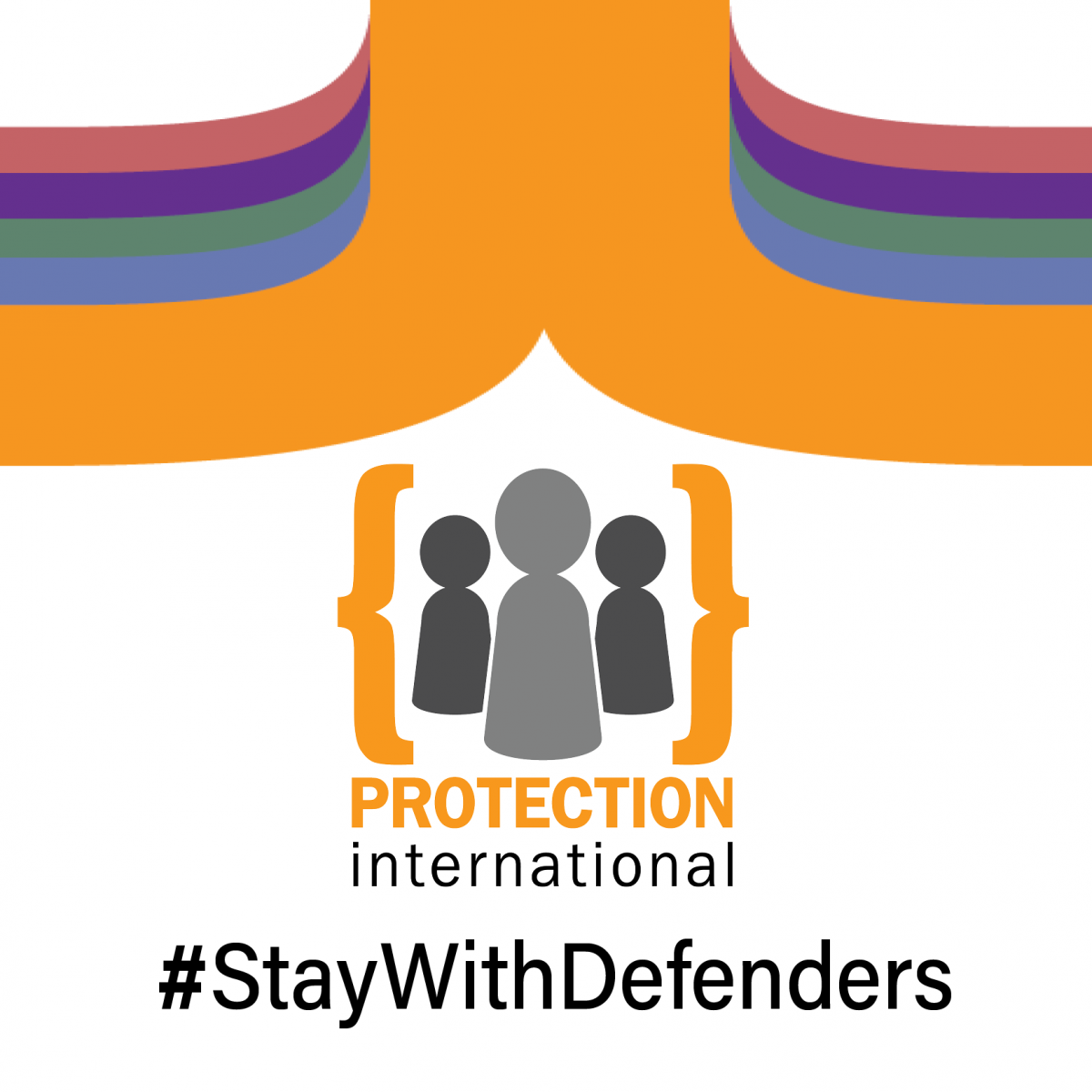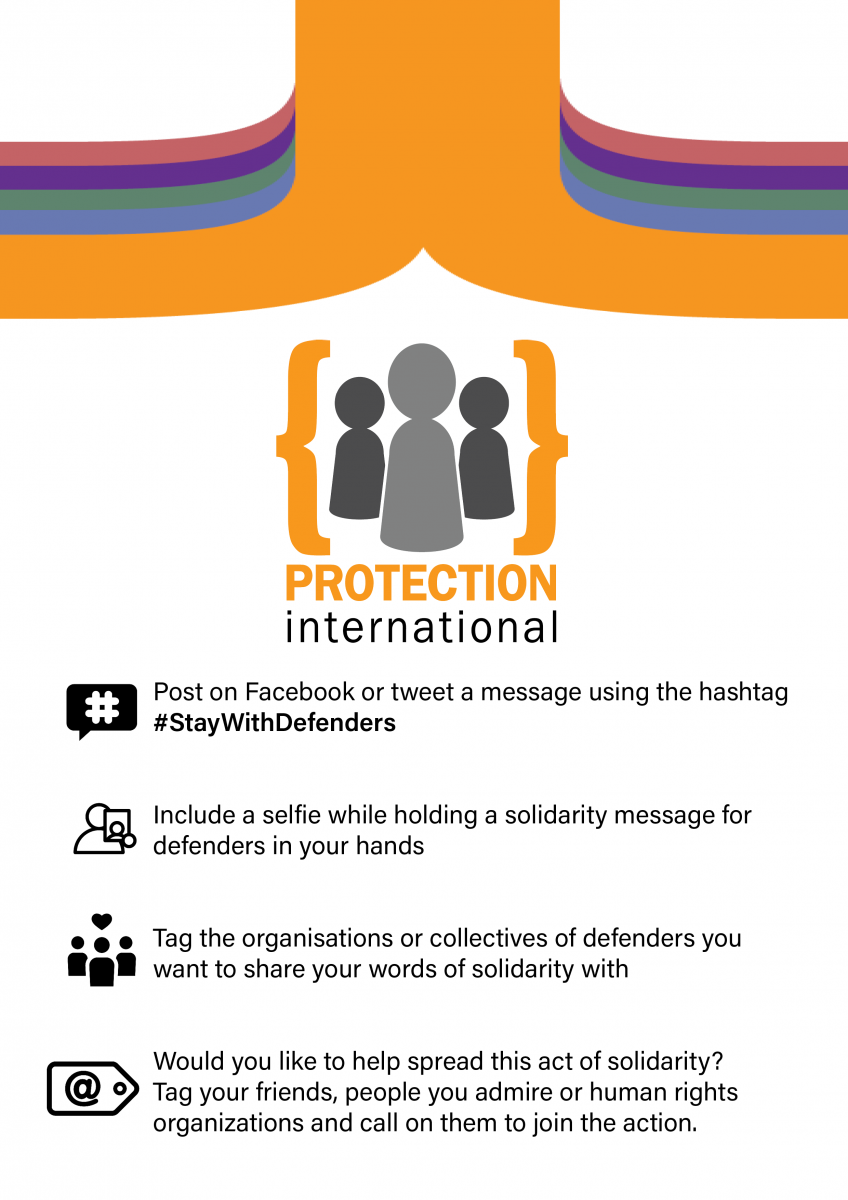COVID-19 is a challenge for all across the world. This is also true for women and men human rights defenders (W/HRDs), who are now even more at risk for standing for the Right to Defend Human Rights (RDHR).

“#StayWithDefenders in times of COVID-19” is our Global Campaign on the Right to Defend Human Rights in these difficult times. With this campaign, we want to call for international solidarity and recognition of both women and men human rights defenders (W/HRDs), be they individuals or collectives, under such times of crisis and uncertainty.
Many W/HRDs are in high-risk settings, and now under a global pandemic, this risk is increasing. Their security and protection must be reinforced, where their Right to Defend Human Rights is endangered, as a result of repressive state measures to curb the spread of the virus. In many cases, the emergency measures taken by governments can sideline international human rights standards, which is a worrying trend deserving our collective attention.
For this reason, we ask those around the world, with the vast majority of us having to stay home at the moment to help eradicate COVID-19, to stay with defenders and show solidarity, even from afar and from home, and that we do not forget them in these difficult times. By doing so, our ultimate goal is to give strength and lift the spirits of W/HRDs, especially those most vulnerable, marginalized, and discriminated, so that they can keep up with their important and necessary role and fully enjoy their Right to Defend Human Rights (RDHR).
Why are we launching this campaign?
The impact of the COVID-19 virus has reached the four corners of the globe and has affected all parts of society. Yet, some parts have been more affected than others, especially in settings where the right to defend human rights and defenders are most at risk. Many citizens lack access to basic services such as clean water and access to medical care and supplies, such as soap, masks, and hand sanitizer, all the while medical services come under severe pressure. This is clear from statements released by international institutions and actors, such as the United Nations Office for Human Rights, which highlight the urgent need for measures to protect citizens, especially those in vulnerable settings.
Prisons have now become places where citizens are at high risk of the spread of COVID-19, where alarming conditions place detained prisoners, including human rights defenders, under increased stress. Likewise, migrants, refugees, and others under a stateless status will suffer gravely from the spread of the virus as already evidenced by increased acts of xenophobia and racism worldwide. The conditions that these people survive under are not fit to face such a pandemic. The global increase in gender-based and domestic violence is another alarming outcome of COVID-19, with figures showing that demand for support services is rapidly increasing across the world, particularly in economies worst hit by the pandemic. These are just a few of the many situations created by the spread of COVID-19 worldwide.
This new landscape is severely affecting the lives and work of women and men human rights defenders, especially in those settings where the Right to Defend Human Rights and defenders are most at risk. In front of this new threat, the response of many states has been to implement a state of emergency. Still, history has shown that, in some contexts, such a measure can negatively impact human rights and the Right to Defend Human Rights. Governments must refrain from using the COVID-19 pandemic as an excuse to crack down on human rights defenders and their collectives. All responses to the crisis must be evidence-based, legal, proportionate, non-discriminatory, time-limited to the pandemic duration, and respect human dignity, independence, and autonomy. Emergency measures which include surveillance, intimidation, aggression, or repression directed against human rights defenders must be banned. Although we are living in hard and complex times, it is essential for governments to prevent this scenario from happening, to respond humanely and on time to the needs and protection of their citizens, and to acknowledge the essential role played by civil society and human rights defenders.
How can you join our campaign?
“#StayWithDefenders in times of COVID-19” is also an open social media campaign, calling on each one of us to show solidarity with women and men human rights defenders (W/HRDs) through the posting of messages of support and photos.
All contributions are welcome, be they from individuals or collectives, as long as they fit with the ultimate goal of our campaign: Showing international solidarity and recognition to women and men human rights defenders under such times of crisis and uncertainty.
- Compose a Tweet and/or a Facebook message displaying your full support to W/HRDs and sharing words of solidarity showing you #StayWithDefenders;
- For added impact, since it is always nicer to show the person behind the words and the screens, include a photo of yourself holding a message board with the hashtag #StayWithDefenders;
- Tag the organizations or collectives of defenders you want to share your words of solidarity with;
- Would you like to help spread this act of solidarity? Tag your friends, people you admire or human rights organizations and call on them to join the action.

Our idea is to regularly share these solidarity messages and pictures with the W/HRDs across the globe that PI teams are supporting, especially those living in the most remote and isolated areas.
To thank you all for your participation, we will create an online album posted across PI official social media channels, celebrating all the great pictures you have shared during this action.
Thank you so much for your solidarity!
And don’t forget, #StayWithDefenders!
Additional resources
COVID-19 has already severely affected the lives and work of women and men human rights defenders worldwide. Still, situations are different from one setting to another.
See our latest statements addressing this context and sharing recommendations with governments for a better understanding of the various needs and protection issues:


